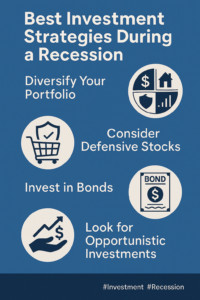Introduction
Recessions can be unsettling for investors, but they also present unique opportunities. Understanding how to navigate market downturns can help investors make informed decisions and protect their wealth. In this guide, we explore the best investment strategies during a recession, focusing on U.S. markets.
Index
- Definition of a Recession
- Investment Strategies During a Recession
- Application of Investment Strategies
- Benefits of Recession-Proof Investments
- Limitations and Risks
- Comparative Analysis of Investment Strategies
- Conclusion
- FAQs
Definition of a Recession
A recession is a period of economic decline characterized by negative GDP growth, rising unemployment, and reduced consumer spending. The National Bureau of Economic Research (NBER) officially defines a recession as a significant decline in economic activity spread across the economy, lasting more than a few months.
Investment Strategies During a Recession
1. Defensive Stocks
Investing in defensive stocks—such as consumer staples, healthcare, and utilities—can provide stability, as these sectors tend to perform well during economic downturns.
2. Dividend Stocks
Companies with strong dividend histories provide consistent income and are less volatile than growth stocks during a recession.
3. Bonds and Fixed-Income Investments
U.S. Treasury bonds, municipal bonds, and high-quality corporate bonds are safe havens that preserve capital and generate stable returns.
4. Real Estate Investment Trusts (REITs)
While real estate can be volatile, certain REITs—such as those in healthcare and industrial sectors—can remain resilient during recessions.
5. Gold and Precious Metals
Gold has historically been a hedge against economic downturns and inflation.
6. Dollar-Cost Averaging
Instead of attempting to time the market, investors can use dollar-cost averaging (DCA) to invest gradually, reducing the impact of market fluctuations.
7. Index Funds and ETFs
Low-cost index funds and exchange-traded funds (ETFs) provide diversification and reduce individual stock risk.
8. Alternative Investments
Assets such as commodities, hedge funds, and private equity can provide additional diversification and protection.
Application of Investment Strategies
Implementing these strategies requires discipline and a focus on long-term goals. Investors should:
- Rebalance their portfolios to ensure proper asset allocation.
- Focus on quality investments with strong fundamentals.
- Maintain liquidity to seize opportunities as they arise.
- Seek professional advice to align investment decisions with financial goals.
Benefits of Recession-Proof Investments
- Stability: Defensive stocks and bonds provide steadier returns.
- Income Generation: Dividend stocks and bonds offer passive income.
- Wealth Preservation: Safe-haven assets like gold protect against inflation.
- Opportunities for Growth: Market downturns create opportunities to buy undervalued stocks.
- Diversification: ETFs and alternative investments reduce risk exposure.
Limitations and Risks
- Lower Returns: Conservative investments may underperform in bull markets.
- Market Timing Risks: Investing during a downturn requires patience, as recoveries can take time.
- Liquidity Concerns: Some assets, like real estate, may be harder to sell quickly.
- Interest Rate Risks: Bond prices can fluctuate with changing interest rates.
- Inflation Risks: Certain fixed-income investments may not keep pace with inflation.
Comparative Analysis of Investment Strategies
| Investment Strategy | Pros | Cons |
|---|---|---|
| Defensive Stocks | Stability, consistent demand | Lower growth potential |
| Dividend Stocks | Passive income, strong financials | Dividend cuts in downturns |
| Bonds | Safe, predictable returns | Sensitive to interest rate changes |
| REITs | Real estate exposure, dividends | Market-dependent performance |
| Gold & Precious Metals | Inflation hedge, store of value | Volatility, no yield |
| Dollar-Cost Averaging | Reduces risk, disciplined approach | Requires patience |
| Index Funds & ETFs | Diversification, low cost | Market-dependent returns |
| Alternative Investments | Additional diversification | Complexity, higher risk |
Conclusion
Recessions pose challenges, but they also offer investment opportunities. A balanced strategy incorporating defensive assets, dividend-paying stocks, bonds, and alternative investments can help investors navigate downturns effectively. By maintaining a disciplined approach, diversifying investments, and focusing on long-term goals, investors can mitigate risks and emerge stronger from economic downturns.
FAQs
1. What is the safest investment during a recession?
U.S. Treasury bonds and defensive stocks in sectors like utilities and healthcare are among the safest investments.
2. Should I invest in stocks during a recession?
Yes, but focus on high-quality, recession-resistant stocks with strong balance sheets.
3. Is real estate a good investment during a recession?
It depends. Commercial real estate may struggle, but residential and industrial REITs can be resilient.
4. How does gold perform during a recession?
Gold often acts as a safe-haven asset and performs well during economic uncertainty.
5. Are bonds a better investment than stocks in a recession?
Bonds provide stability, but a balanced portfolio with both stocks and bonds is advisable.
6. What industries perform well during a recession?
Consumer staples, healthcare, utilities, and discount retailers tend to perform better.
7. What is dollar-cost averaging, and how does it help in a recession?
Dollar-cost averaging involves investing a fixed amount regularly, reducing the impact of market volatility.
8. Should I pull my money out of the market during a recession?
Not necessarily. Staying invested and following a strategic approach is often more beneficial.
9. How do I prepare my portfolio for a recession?
Diversify assets, focus on quality investments, and maintain liquidity.
10. Can I still make money during a recession?
Yes, by investing in recession-resistant assets, adopting a long-term perspective, and seizing opportunities in undervalued stocks.


